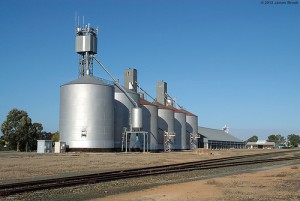GrainCorp, Australia’s biggest listed agribusiness, expects the drought in Queensland and northern NSW to significantly reduce profits this year.

Image credit: flickr User: VRfan
According to the article on ABC News, this year’s grain exports stands at 4 million tonnes, which is almost half that of 2013. This is mainly because the receivals to silos were 7.7 million tonnes, down from 10.4 million tonnes in 2013, and because grain is moving from south to north as stockfeed.
Executive chairman Don Taylor has told the company’s annual general meeting in Sydney that GrainCorp does not have a monopoly on grain handling and has to compete with aggressive and rich multinational companies for every tonne of grain.
Mr Taylor also complained about the lack of regulations on competitors at places like Newcastle grain terminal, where GrainCorp is forced to comply with strict and costly disclosure rules that do not apply to its competitors.
On a brighter note, Mr Taylor said the company’s investments in malting barley and edible oils are starting to fare better and see greater levels of investment.
He also revealed that GrainCorp was looking to spend $70 million on new facilities at Port Kembla in NSW, Pinkenba at the Port of Brisbane, and Fremantle, as part of its expansion program aimed at increasing earnings incrementally.
On top of that, GrainCorp is also investing in liquid storage at three terminals, hoping that it will lift earnings by $30 million a year and insure against shocks like drought.
The company is already spending up to $125 million to expand its edible oils manufacturing at Numurka in Central Victoria, and at West Footscray, Melbourne, catering tothe demand for canola oil in Sydney and Melbourne and bakery fats, like shortening.
According to GrainCorp estimates, this year’s export profits are expected to be between $80 to $100 million, down from $175 million last year.



















